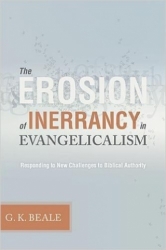Biblical inerrancy is a doctrine that has been shared among Christians of all stripes since the beginning. “What the Bible says, God says” states and settles the matter succinctly. The doctrine came under assault of course with the rise of the higher criticism, but now again in our own generation it has come under question even among professing evangelicals. Peter Enns is one contemporary writer who has challenged inerrancy on several fronts. Here Greg Beale even-handedly examines his work and presents his own challenges to the presuppositions that underlie this contemporary revolt.
Can the Bible be historically inaccurate while still serving as the authoritative word on morality and salvation? Beale concludes that it cannot, and his work is an aid to all who support biblical inerrancy in defending their position against postmodern attacks.
A timely and important book.
Table of Contents
1. Is a Traditional Evangelical View of Scripture’s Authority Compatible with Recent Developments in Old Testament Studies? Part 1
2. Is a Traditional Evangelical View of Scripture’s Authority Compatible with Recent Developments in Old Testament Studies? Part 2
3. Is a Traditional Evangelical View of Scripture’s Authority Compatible with Recent Developments in the Study of the Old Testament in the New? Part 1
4. Is a Traditional Evangelical View of Scripture’s Authority Compatible with Recent Developments in the Study of the Old Testament in the New? Part 2
5. A Specific Problem Confronting the Authority of the Bible: Should the New Testament’s Claim That the Prophet Isaiah Wrote the Whole Book of Isaiah Be Taken at Face Value?
6. Can Old Testament Cosmology Be Reconciled with Modern Scientific Cosmology? Part 1
7. Can Old Testament Cosmology Be Reconciled with Modern Scientific Cosmology? Part 2
Conclusion
Appendix 1: Postmodern Questions of Authorial Intent, Epistemology, and Presuppositions and Their Bearing on the Authority of the Old Testament in the New
Addendum to Appendix 1: Brief Reflection on the Relationship of Globalism to Postmodernism
Appendix 2: Chicago Statement on Biblical Inerrancy with Exposition
Appendix 3: Selected Quotations from Karl Barth’s Church Dogmatics on the Fallible and Errant
Nature of Scripture
Selected Bibliography
Author Index
Scripture Index
Endorsements
Thomas R. Schreiner
“Confidence in the authority and inerrancy of Scripture is ebbing today, even in evangelicalism. Postmodernism and certain hermeneutical presuppositions threaten to undermine the foundations of evangelicalism. Greg Beale’s sturdy, convincing, and courageous defense of the accuracy and inerrancy of Scripture bolsters our assurance that God’s Word is true. Praise God for this scholarly and spirited defense of the truth of Scripture.”
Gerald Bray
“At last, a leading biblical scholar has produced a full-blown defense of biblical inerrancy in a user-friendly style. This is just what is needed in the current debate, and Beale has provided it magnificently.”
John Currid
“The nature of Scripture has been an ongoing issue of controversy in evangelicalism for decades, yet today the orthodox position of inerrancy is under severe attack as in no other period—and the attack is coming from evangelicals themselves. Beale has done a great service in attempting to bring us back to the right way of thinking about the Scriptures. They are indeed fully inerrant and fully authoritative. This book is a must-read for our generation.”
David M. Howard, Jr.
“As evangelical scholarship has come of age and evangelical scholars confidently take their place in the mainstream academy, a danger lurks that we might lose any sense of what makes us evangelical scholars. This book sounds a much-needed warning against abandoning our evangelical moorings. Beale provides a penetrating critique of Peter Enns’s challenge to evangelical notions of inerrancy, leaning on reputable Old Testament and ancient Near Eastern scholarship in doing so. He also presents invaluable original analyses to bolster his case in areas of his specialties—early Judaism, hermeneutics, and the Old Testament in the New. I highly recommend this book.”
